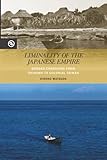Liminality of the Japanese Empire : Border Crossings from Okinawa to Colonial Taiwan / Hiroko Matsuda; ed. by Kieko Matteson, Anand A. Yang.
Material type: TextSeries: Perspectives on the Global PastPublisher: Honolulu : University of Hawaii Press, [2018]Copyright date: ©2018Description: 1 online resource (296 p.) : 11 b&w illustrations, 4 mapsContent type:
TextSeries: Perspectives on the Global PastPublisher: Honolulu : University of Hawaii Press, [2018]Copyright date: ©2018Description: 1 online resource (296 p.) : 11 b&w illustrations, 4 mapsContent type: - 9780824867560
- 9780824877071
- 305.8956 23
- DS799.43.R98 .M387 2019
- online - DeGruyter
- Issued also in print.
| Item type | Current library | Call number | URL | Status | Notes | Barcode | |
|---|---|---|---|---|---|---|---|
 eBook
eBook
|
Biblioteca "Angelicum" Pont. Univ. S.Tommaso d'Aquino Nuvola online | online - DeGruyter (Browse shelf(Opens below)) | Online access | Not for loan (Accesso limitato) | Accesso per gli utenti autorizzati / Access for authorized users | (dgr)9780824877071 |
Browsing Biblioteca "Angelicum" Pont. Univ. S.Tommaso d'Aquino shelves, Shelving location: Nuvola online Close shelf browser (Hides shelf browser)

|

|

|

|

|

|

|
||
| online - DeGruyter Mahathir's Islam : Mahathir Mohamad on Religion and Modernity in Malaysia / | online - DeGruyter Cosmopolitan Dreams : The Making of Modern Urdu Literary Culture in Colonial South Asia / | online - DeGruyter Food Safety after Fukushima : Scientific Citizenship and the Politics of Risk / | online - DeGruyter Liminality of the Japanese Empire : Border Crossings from Okinawa to Colonial Taiwan / | online - DeGruyter Maritime Ryukyu, 1050-1650 / | online - DeGruyter Tadaima! I Am Home : A Transnational Family History / | online - DeGruyter Pure Lands in Asian Texts and Contexts : An Anthology / |
Frontmatter -- Contents -- Illustrations, Maps, and Tables -- Acknowledgments -- Note on Asian Languages -- Introduction -- CHAPTER 1. Migration in the Age of Modern Colonialism -- CHAPTER 2. Crossing the National/Imperial Border -- CHAPTER 3. Making Distinctions in the Extension of Japan -- CHAPTER 4. Imperial Schooling across the Border -- CHAPTER 5. Between Japanese and Okinawan -- CHAPTER 6. Going Home? -- Epilogue -- Appendix -- Abbreviations -- Notes -- Bibliography -- Index
restricted access online access with authorization star
http://purl.org/coar/access_right/c_16ec
Okinawa, one of the smallest prefectures of Japan, has drawn much international attention because of the long-standing presence of US bases and the people's resistance against them. In recent years, alternative discourses on Okinawa have emerged due to the territorial disputes over the Senkaku Islands, and the media often characterizes Okinawa as the borderland demarcating Japan, China (PRC), and Taiwan (ROC). While many politicians and opinion makers discuss Okinawa's national and security interests, little attention is paid to the local perspective toward the national border and local residents' historical experiences of border crossings.Through archival research and first-hand oral histories, Hiroko Matsuda uncovers the stories of common people's move from Okinawa to colonial Taiwan and describes experiences of Okinawans who had made their careers in colonial Taiwan. Formerly the Ryukyu Kingdom and a tributary country of China, Okinawa became the southern national borderland after forceful Japanese annexation in 1879. Then, following Japanese victory in the First Sino-Japanese War and the cession of Taiwan in 1895, Okinawa became the borderland demarcating the Inner Territory from the Outer Territory. The borderland paradoxically created distinction between the two sides, while simultaneously generating interactions across them. Matsuda's analysis of the liminal experiences of Okinawan migrants to colonial Taiwan elucidates both Okinawans' subordinate status in the colonial empire, and their use of the border between the nation and the colony.Drawing on the oral histories of former immigrants in Taiwan currently living in Okinawa or the Japanese Main Islands, Matsuda debunks the conventional view that Okinawan local history and Japanese imperial history are two separate fields by demonstrating the entanglement of Okinawa's modernity with Japanese colonialism. The first English-language book to use the oral historical materials of former colonial migrants and settlers-most of whom did not experience the Battle of Okinawa-Liminality of the Japanese Empire presents not only the alternative war experiences of Okinawans but also the way in which these colonial memories are narrated in the politics of war memory within the public space of contemporary Okinawa.
Issued also in print.
Mode of access: Internet via World Wide Web.
In English.
Description based on online resource; title from PDF title page (publisher's Web site, viewed 02. Mrz 2022)


